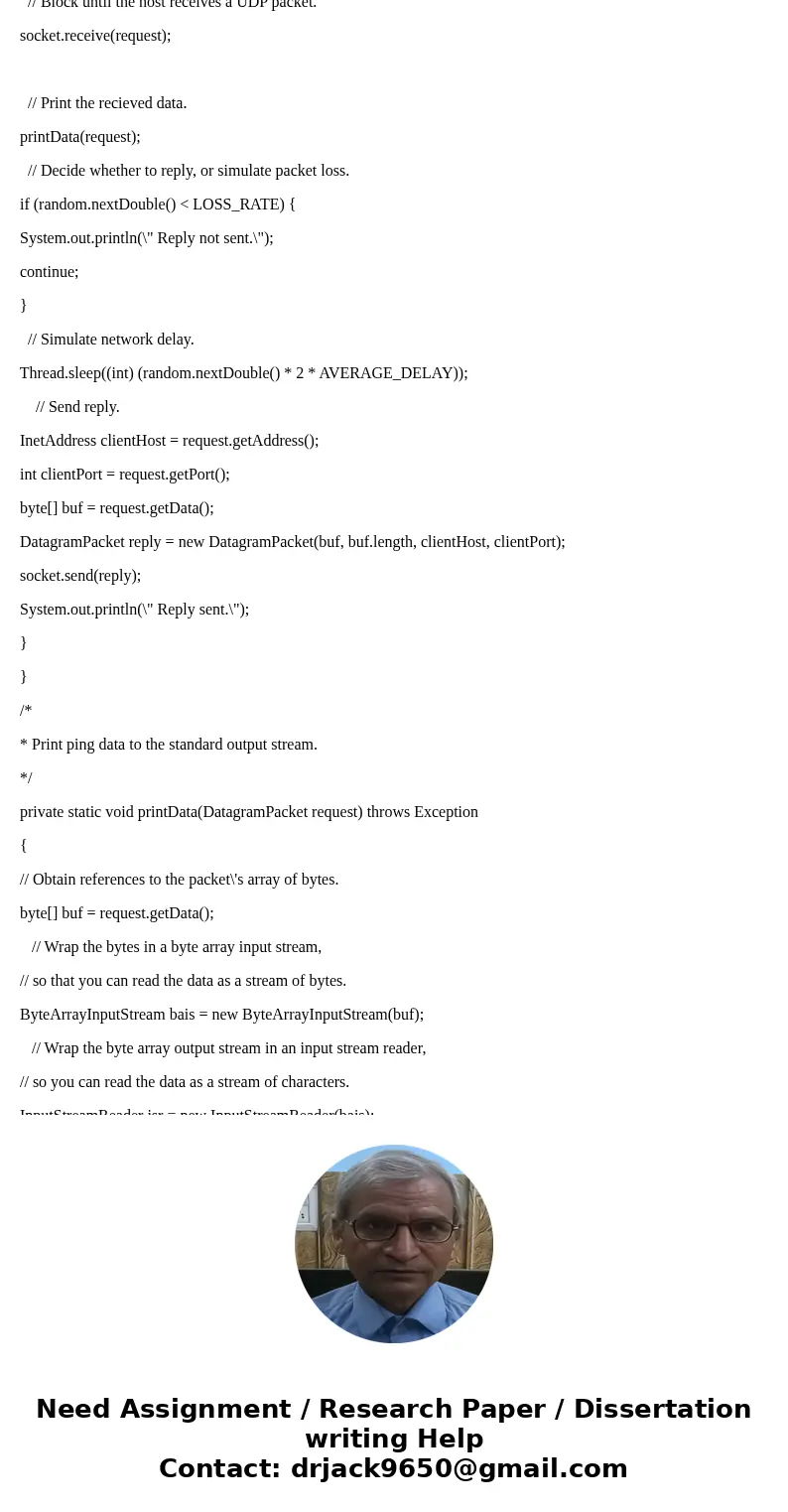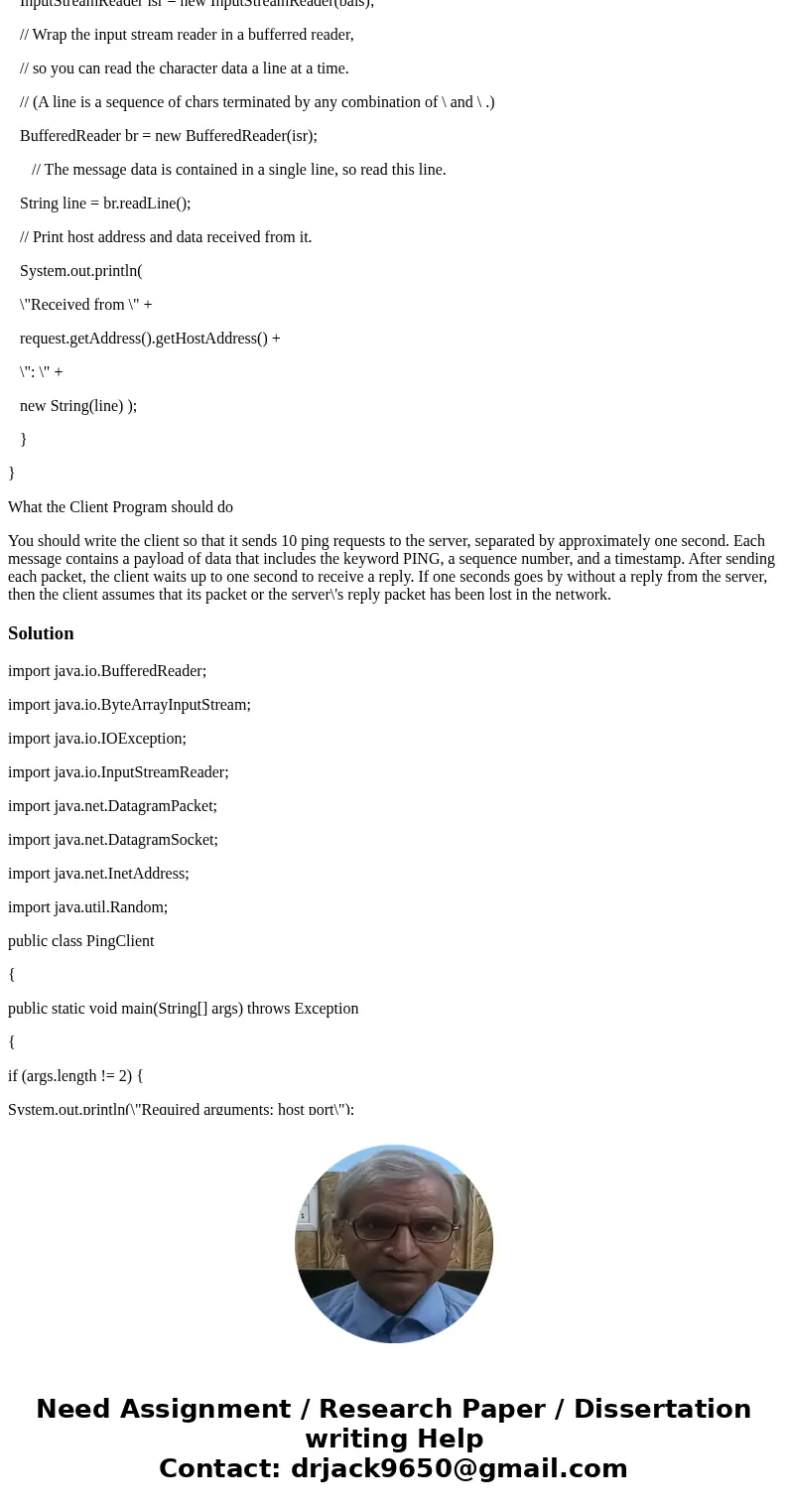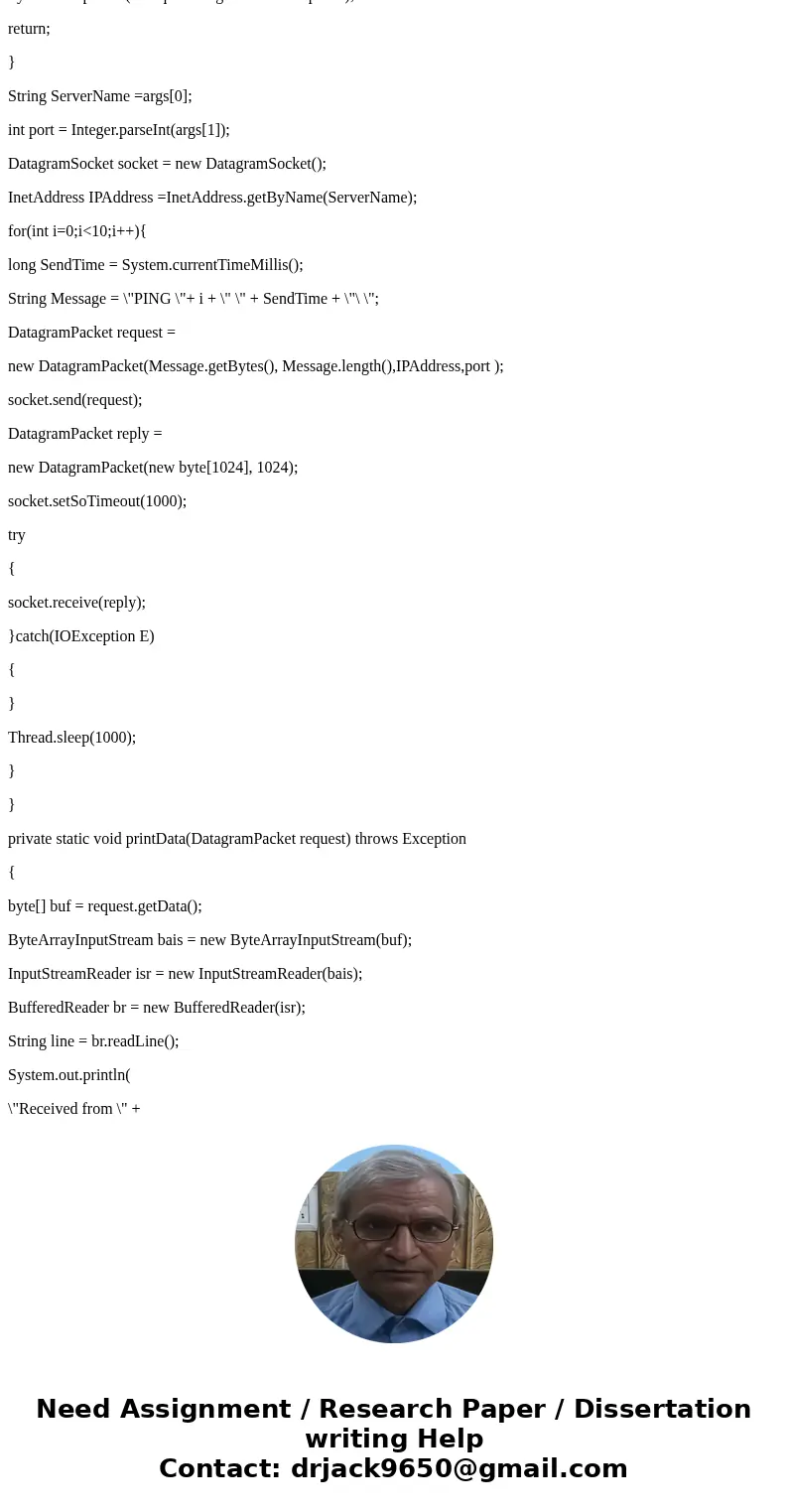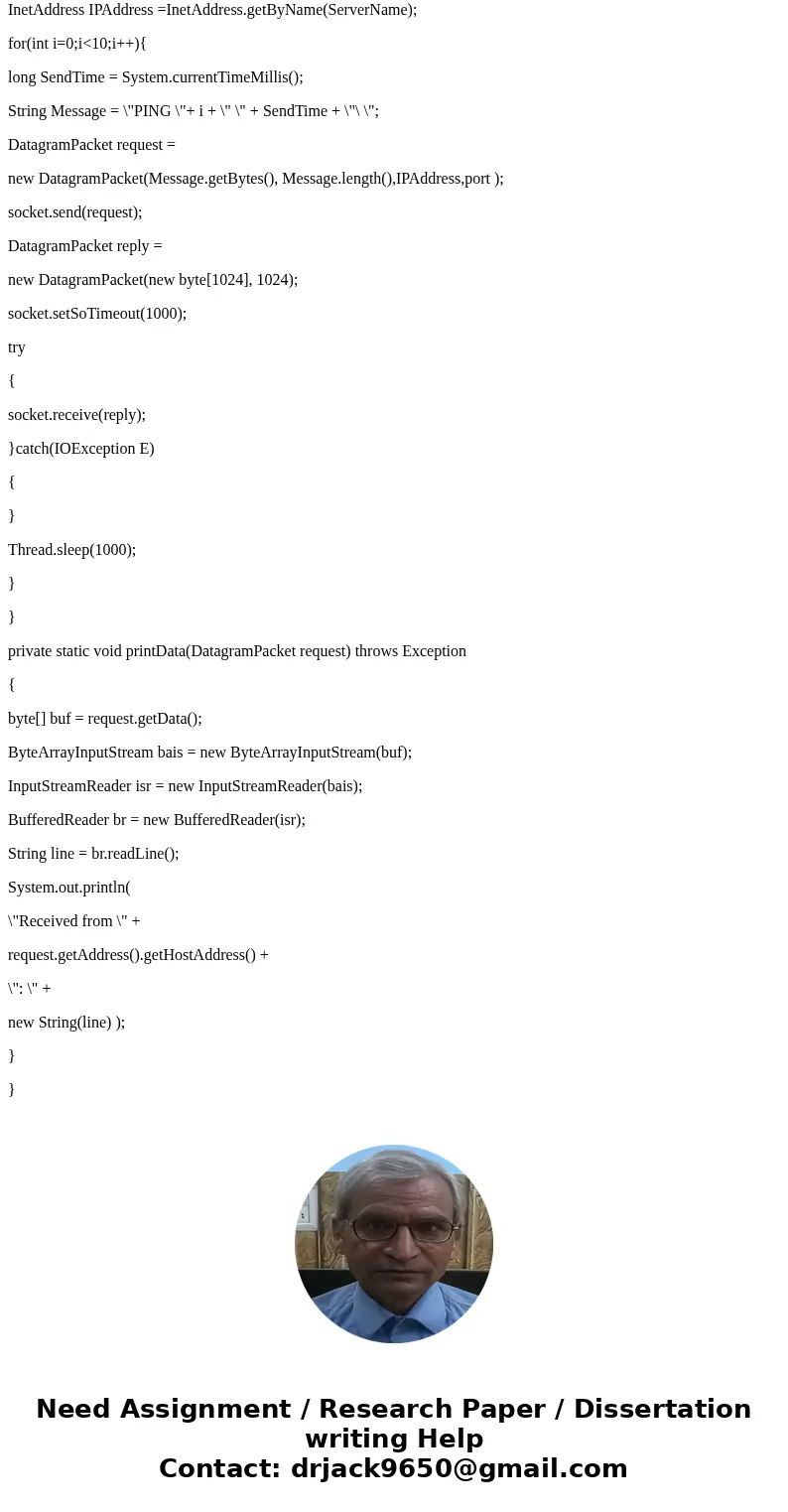In this project you will create a pair of Ping ClientServer
In this project you will create a pair of Ping Client/Server program built on UDP in java.
Your ping program is to send 10 ping messages to the target server over UDP, separated by approximately one second. Each message contains a payload of data that includes the keyword PING, a sequence number, and a timestamp. After sending each packet, the client waits up to one second to receive a reply. If one seconds goes by without a reply from the server, then the client assumes that its packet or the server\'s reply packet has been lost in the network.
Server code:
import java.io.*;
import java.net.*;
import java.util.*;
/*
* Server to process ping requests over UDP.
*/
public class PingServer
{
private static final double LOSS_RATE = 0.3;
private static final int AVERAGE_DELAY = 100; // milliseconds
public static void main(String[] args) throws Exception
{
// Get command line argument.
if (args.length != 1) {
System.out.println(\"Required arguments: port\");
return;
}
int port = Integer.parseInt(args[0]);
// Create random number generator for use in simulating
// packet loss and network delay.
Random random = new Random();
// Create a datagram socket for receiving and sending UDP packets
// through the port specified on the command line.
DatagramSocket socket = new DatagramSocket(port);
// Processing loop.
while (true) {
// Create a datagram packet to hold incomming UDP packet.
DatagramPacket request = new DatagramPacket(new byte[1024], 1024);
// Block until the host receives a UDP packet.
socket.receive(request);
// Print the recieved data.
printData(request);
// Decide whether to reply, or simulate packet loss.
if (random.nextDouble() < LOSS_RATE) {
System.out.println(\" Reply not sent.\");
continue;
}
// Simulate network delay.
Thread.sleep((int) (random.nextDouble() * 2 * AVERAGE_DELAY));
// Send reply.
InetAddress clientHost = request.getAddress();
int clientPort = request.getPort();
byte[] buf = request.getData();
DatagramPacket reply = new DatagramPacket(buf, buf.length, clientHost, clientPort);
socket.send(reply);
System.out.println(\" Reply sent.\");
}
}
/*
* Print ping data to the standard output stream.
*/
private static void printData(DatagramPacket request) throws Exception
{
// Obtain references to the packet\'s array of bytes.
byte[] buf = request.getData();
// Wrap the bytes in a byte array input stream,
// so that you can read the data as a stream of bytes.
ByteArrayInputStream bais = new ByteArrayInputStream(buf);
// Wrap the byte array output stream in an input stream reader,
// so you can read the data as a stream of characters.
InputStreamReader isr = new InputStreamReader(bais);
// Wrap the input stream reader in a bufferred reader,
// so you can read the character data a line at a time.
// (A line is a sequence of chars terminated by any combination of \ and \ .)
BufferedReader br = new BufferedReader(isr);
// The message data is contained in a single line, so read this line.
String line = br.readLine();
// Print host address and data received from it.
System.out.println(
\"Received from \" +
request.getAddress().getHostAddress() +
\": \" +
new String(line) );
}
}
What the Client Program should do
You should write the client so that it sends 10 ping requests to the server, separated by approximately one second. Each message contains a payload of data that includes the keyword PING, a sequence number, and a timestamp. After sending each packet, the client waits up to one second to receive a reply. If one seconds goes by without a reply from the server, then the client assumes that its packet or the server\'s reply packet has been lost in the network.
Solution
import java.io.BufferedReader;
import java.io.ByteArrayInputStream;
import java.io.IOException;
import java.io.InputStreamReader;
import java.net.DatagramPacket;
import java.net.DatagramSocket;
import java.net.InetAddress;
import java.util.Random;
public class PingClient
{
public static void main(String[] args) throws Exception
{
if (args.length != 2) {
System.out.println(\"Required arguments: host port\");
return;
}
String ServerName =args[0];
int port = Integer.parseInt(args[1]);
DatagramSocket socket = new DatagramSocket();
InetAddress IPAddress =InetAddress.getByName(ServerName);
for(int i=0;i<10;i++){
long SendTime = System.currentTimeMillis();
String Message = \"PING \"+ i + \" \" + SendTime + \"\ \";
DatagramPacket request =
new DatagramPacket(Message.getBytes(), Message.length(),IPAddress,port );
socket.send(request);
DatagramPacket reply =
new DatagramPacket(new byte[1024], 1024);
socket.setSoTimeout(1000);
try
{
socket.receive(reply);
}catch(IOException E)
{
}
Thread.sleep(1000);
}
}
private static void printData(DatagramPacket request) throws Exception
{
byte[] buf = request.getData();
ByteArrayInputStream bais = new ByteArrayInputStream(buf);
InputStreamReader isr = new InputStreamReader(bais);
BufferedReader br = new BufferedReader(isr);
String line = br.readLine();
System.out.println(
\"Received from \" +
request.getAddress().getHostAddress() +
\": \" +
new String(line) );
}
}





 Homework Sourse
Homework Sourse